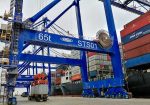The Namibia Industrial Development Agency (NIDA) has launched its annual report, themed “Geared Towards Sustainable Industries,” covering the financial years 2018/2019 to 2023/2024.
The agency set the record by completing six years annual financials within the record period of 6 months. This marked the agency’s first publication in six years, reaffirming its commitment to governance and advancing Namibia’s industrialisation agenda.
Established under the Namibia Industrial Development Agency Act of 2016, NIDA is mandated to lead Namibia’s industrialisation agenda. Over the years, it has remained committed to this mission, laying a strong foundation for the country’s industrial future. At the helm of NIDA, serving under a year as Chief Executive Officer, Richwell Lukonga applauded the entire team at NIDA for working effortlessly to ensure that its annual report comes to fruition. While observing its moment of silence for the late Founding Father, Dr. Sam Nujoma, he noted that he inaugurated its building in 1994. “It is my distinct honour and privilege to welcome you to this historic building, which houses the Namibia Industrial Development Agency (NIDA), which is the predecessor organisation of the Namibia Development Corporation (NDC) and Offshore Development Corporation. The Namibia Development Corporation (NDC) building was inaugurated in 1994 by His Excellency Founding Father and thus makes this gathering a historic one not only in celebrating our milestone achievement of launching the 6-year Annual Report and its financial statements,” he noted.
He further emphasised the importance of keeping the founding fathers legacy alive. “It is important to be said at this historic occasion that this organisation needs to now ensure that the legacy and vision of the founding father of an industrialised nation by 2030 is fully achieved and request that we keep this message of the vision visualised so that we collectively, as a board, management, and all NIDA employees, know that NIDA’s obligations and mandate go beyond where we are going now on a daily basis and a reflection on what we have been occupied with over the last years,” he said.
NIDA’s footprint spans key industrial and agricultural sectors, with strategic projects and infrastructure across Namibia. These include SME parks, industrial and commercial properties, special economic zones (SEZs), and agricultural ventures such as the Kavango Cattle Ranch, Naute Irrigation Project, and Eersbegin Date Project.
The annual report provides a detailed account of NIDA’s operations over the past six years and offers a preview of its 2025/26-2029/30 Integrated Strategic Business Plan (ISBP). The chosen theme, “Geared Towards Sustainable Industries,” reflects NIDA’s alignment with Namibia’s Vision 2030, National Development Plans, and the United Nations Sustainable Development Goals (SDGs). It highlights NIDA’s transition from traditional industrial practices to innovative, sustainable solutions that promote industrial growth without compromising natural resources or community well-being. The theme thus encapsulates NIDA’s strategic direction over the last six years and sets the tone for its future trajectory, particularly as it navigates the implementation of its ISBP.
Julius Nghikevali, the Executive Consultant CFO Portfolio, presented the financial report, which highlighted some of the key milestones. “NIDA has a 30% increase in assets to N$1.37 billion in the past six years. Over the last 6 years, total income increased by 20% to N$164 million from 2019 to 2024,” he remarked.
Nghikevali further spoke on the liabilities and financial ratios. “Low gearing ratio of 22% maintained despite liabilities more than doubling to N$248 million; the current ratio has, however, declined steadily to 50% in 2024, from 79% in 2019. Annual total income increased by 20% over the period to N$165 million. While annual total expenditure increased by 28% to N$231 million, operating losses stood at N$102 million in 2024. A net profit of N$33 million was recorded in 2020,” he enlightened.
Finally, he enlightened on the financial statements. “All the financial reports have been submitted, and they have been approved by the Ministry of Finance,” he stated.
Speaking at the launch, Minister of Finance Hon. Shiimi Iipumbu applauded the NIDA finance team for their effectiveness in compiling the annual report: “The fact that you now have an annual report with financial statements, that now says this is how we have spent the money, this is where we are in terms of our financial ratios—that’s a whole mark of transformation and success. This is a very good starting point,” he remarked.
Shiimi further provided insights and recommendations: “You have three periods of assets; you don’t need additional capital. What you need is working capital, not equity capital. The assets must work; the assets must generate cash for the business to be sustainable; you don’t need to be capitalised as you have all the cash,” he noted.
The deputy minister of industrialisation, Hon. Verna Sinimbo, applauded the agency for sticking to its mandate and leading the industrialisation agenda. “On behalf of the Ministry of Industrialisation and Trade, I herewith express our pride in NIDA for driving Namibia’s industrialisation agenda and ensuring the goal of industrialising Namibia has materialised to achieve the Harambee vision. Through their efforts to create employment opportunities, NIDA plays a key role in the fight against poverty in Namibia,” she applauded.
The Chairperson of the NIDA Board of Directors, Sebulon Kankondi, outlined the agency’s future trajectory. “Looking ahead, NIDA’s 2025/26–2029/30 Integrated Strategic Business Plan (ISBP) outlines clear initiatives aimed at improving financial sustainability, diversifying revenue streams, and strengthening cost management strategies. The recent revaluation of NIDA’s property assets is a step towards ensuring that we are well-capitalised to pursue future growth opportunities,” he stated.
To further solidify its commitment to sustainable development, NIDA is embracing digital transformation as the core of its strategy. This includes modernising operational processes, integrating smart industrial technologies, and using data-driven decision-making to optimise efficiency. By investing in digital infrastructure, NIDA aims to improve service delivery and enhance its ability to attract foreign direct investment.
Another priority for NIDA is strengthening partnerships with key stakeholders, including government entities, private sector investors, and international development agencies. Collaborative efforts in policy formulation, investment promotion, and industrial research will ensure a holistic approach to Namibia’s industrialisation journey.
Furthermore, NIDA is committed to fostering entrepreneurship and SME development. By providing access to affordable industrial spaces, financial support mechanisms, and mentorship programs, NIDA seeks to empower local businesses and create a thriving ecosystem for small and medium enterprises. This approach is critical to achieving inclusive economic growth and long-term industrial sustainability.
As part of its sustainability drive, NIDA is also prioritising environmental responsibility. By adopting green energy solutions and promoting eco-friendly industrial practices, the agency is aligning with global standards for responsible industrialisation. Initiatives such as solar-powered industrial parks, waste recycling programs, and sustainable water management systems are integral to its vision for a greener Namibia.
With a clear roadmap for the years ahead, NIDA remains committed to driving industrialisation, economic growth, and sustainable development in Namibia.
END.










